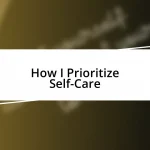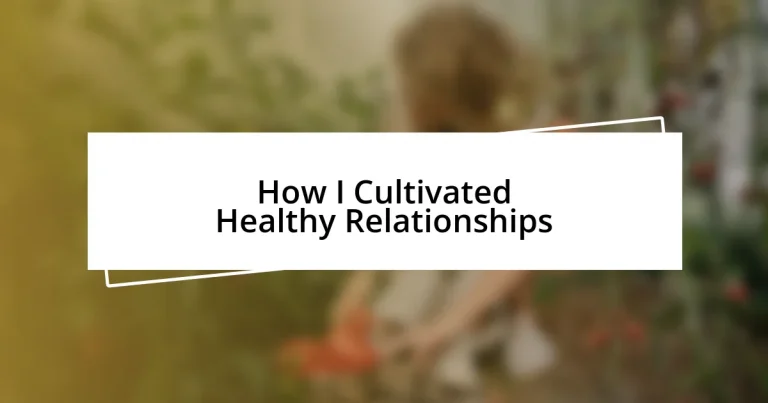Key takeaways:
- Healthy relationships thrive on trust, communication, and empathy, fostering deeper connections.
- Identifying personal relationship values enhances understanding and navigates conflicts effectively.
- Setting and respecting boundaries is crucial for maintaining mutual respect and emotional well-being.
- Consistent communication, adaptability, and celebrating achievements are vital for sustaining long-term relationships.
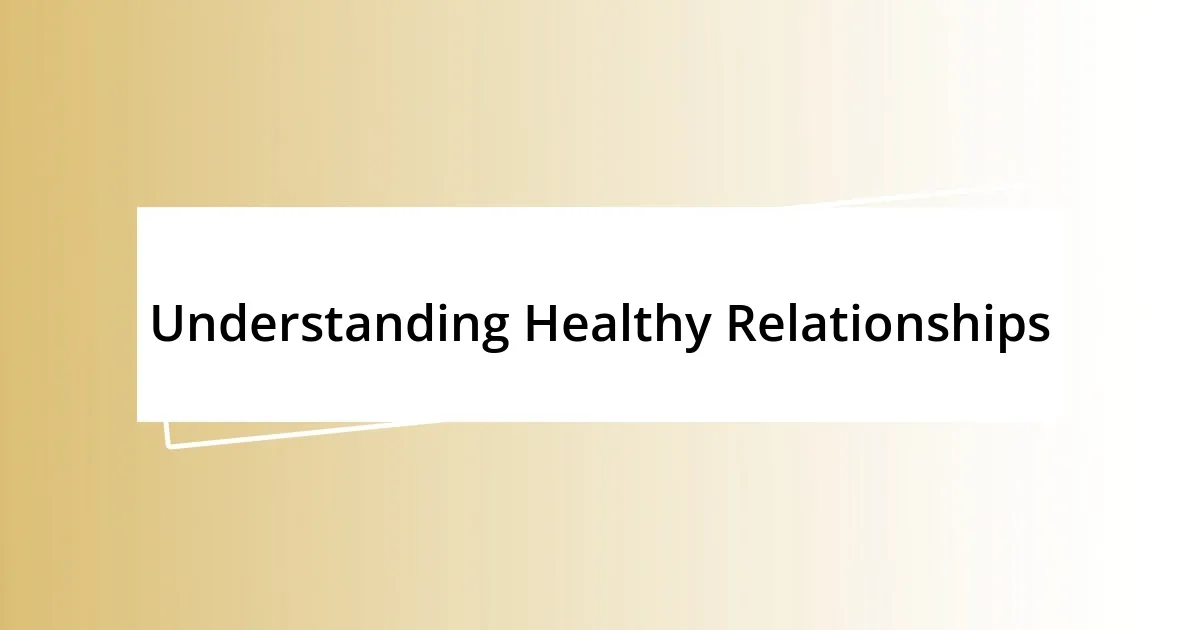
Understanding Healthy Relationships
Healthy relationships are built on trust and mutual respect. I remember a time when a close friend of mine shared a personal challenge with me. I felt honored that she trusted me enough to confide, and it deepened our bond. Isn’t that a beautiful aspect of relationships?
Communication plays a critical role, too. Once, I struggled to express my feelings in a romantic relationship, and it created unnecessary tension. It’s interesting how a simple conversation can transform not just one moment, but the entire dynamic between two people. How often do we forget to simply check in with each other?
Empathy is another essential ingredient. Just last week, I listened to a family member vent about her day. I realized that being there for someone doesn’t always require solutions; sometimes, it’s just about understanding. Have you ever noticed how a little empathy can create an environment where everyone feels valued? When relationships thrive on empathy, they become spaces where we can grow and be our true selves.
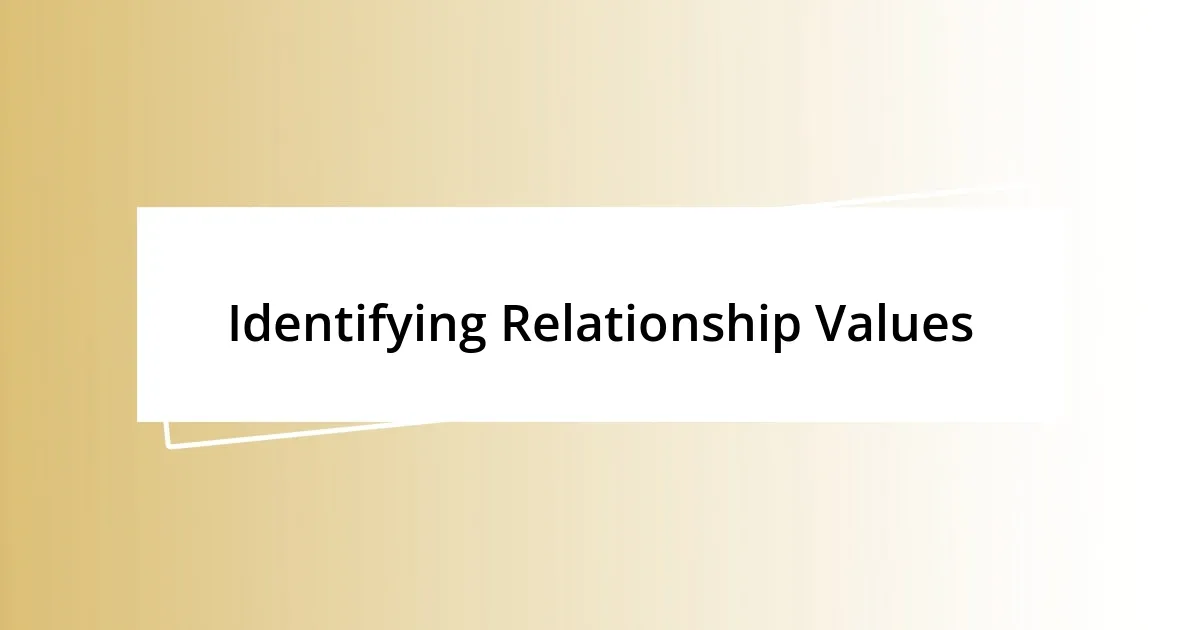
Identifying Relationship Values
Identifying what truly matters in a relationship is a journey worth taking. For me, it started with reflecting on my past experiences. I realized that honesty and loyalty were top priorities. Each time I felt deceived or abandoned, the pain reinforced the value of unconditional support. Have you ever thought about which values resonate most with you?
I often find myself discussing values with close friends, and it’s fascinating how individual perspectives can differ. In my circle, respect and understanding frequently come up as cornerstones of lasting relationships. I remember a conflict that arose between two friends of mine due to a lack of communication. They both valued different things—one sought independence, while the other craved closeness. This mismatch highlighted the need for open dialogue about core values to navigate complexities effectively.
To really dig deep, I recommend developing a personal list of relationship values. This exercise has been eye-opening for me. I started by writing down what I appreciated in my closest connections, and surprisingly, patterns emerged. It became clear that shared interests and emotional support consistently topped my list. By comparing this with what others valued, I gained insights into how to strengthen my relationships. Have you created your own list yet? It just might lead to revelations that can enhance your connections.
| Relationship Values | Personal Experiences |
|---|---|
| Honesty | Feeling betrayed in a past friendship emphasized this for me. |
| Respect | A conflict between friends taught me the importance of understanding different needs. |
| Emotional Support | Realizing I value people who are there for me during tough times. |
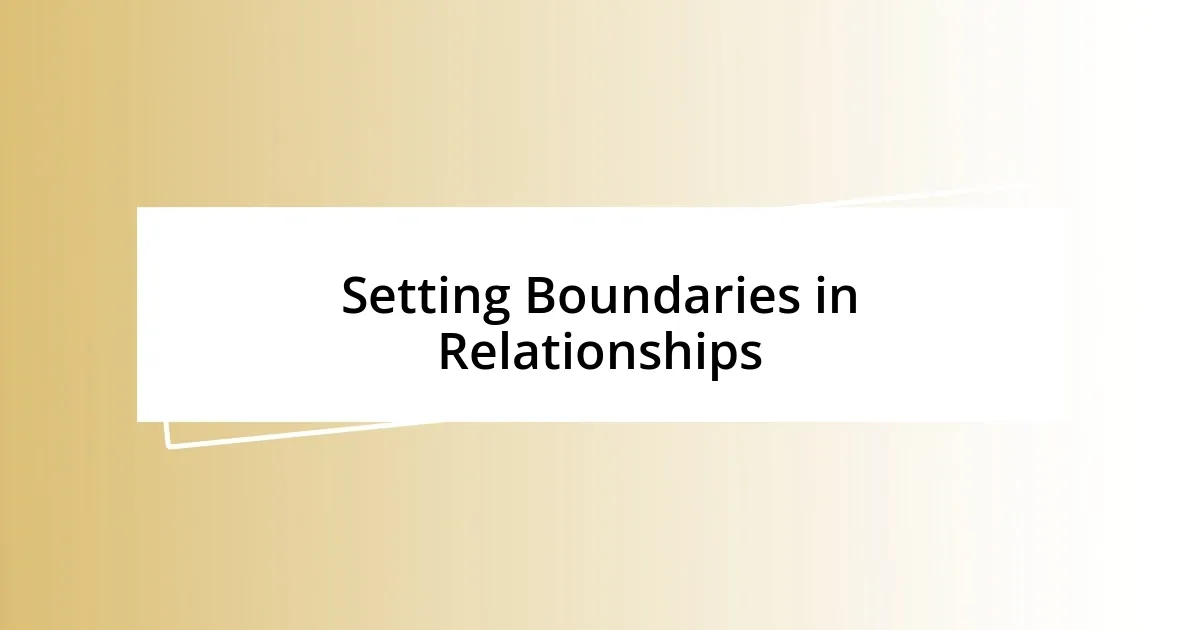
Setting Boundaries in Relationships
Setting boundaries in relationships is essential for maintaining a balance of respect and care. I once had a friend who would frequently call late at night, expecting me to drop everything to listen. Initially, I felt guilty about saying no, fearing it would hurt our friendship. However, after realizing I hardly had any downtime, I mustered the courage to express my need for quiet evenings. That conversation not only preserved my peace but also strengthened our understanding of each other’s limits.
Boundaries act as a protective shield that nurtures healthy connections. Here are some key points to consider:
- Clarity: Clearly define what behaviors are acceptable and which are not. This can prevent misunderstandings and resentment.
- Respect: When you voice your boundaries, expect others to respect them, just as you should respect theirs.
- Flexibility: While it’s important to have boundaries, be open to discussions about adjusting them as relationships evolve.
- Self-Awareness: Know your limits and why they matter to you. This insight helps in articulating your needs effectively.
- Courage: Sometimes, setting boundaries can feel daunting, but remember: your emotional well-being is worth the effort.
By sharing my own experience, I’ve learned that boundaries aren’t about building walls; they’re about creating a safe space for growth and connection. What about you? Have you started exploring the boundaries in your own relationships?
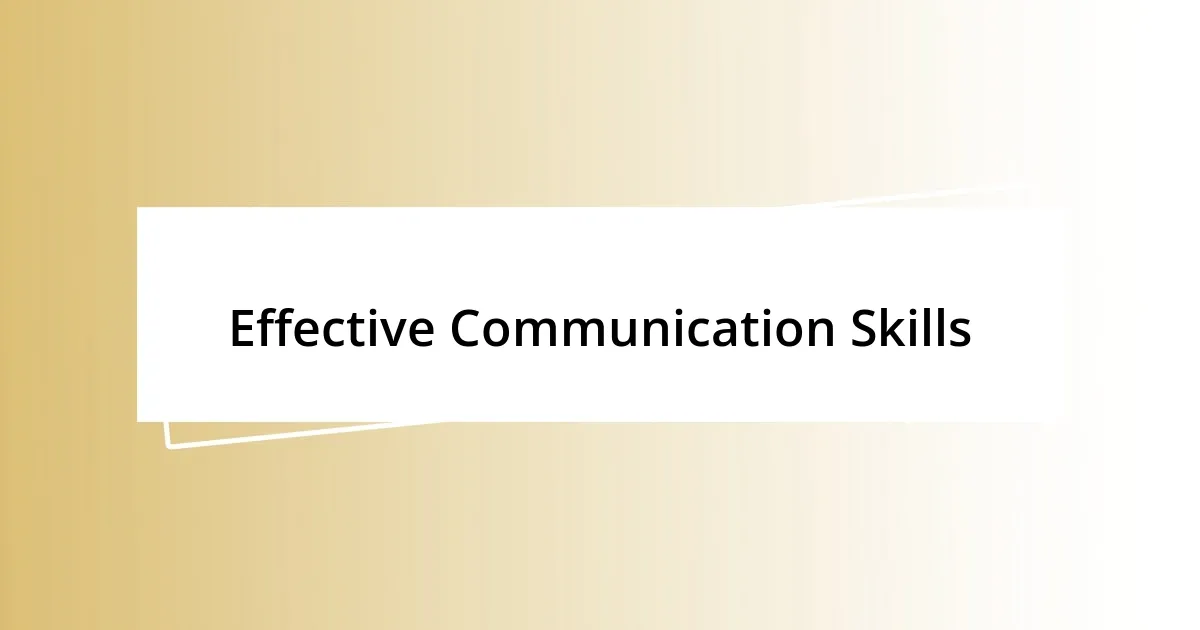
Effective Communication Skills
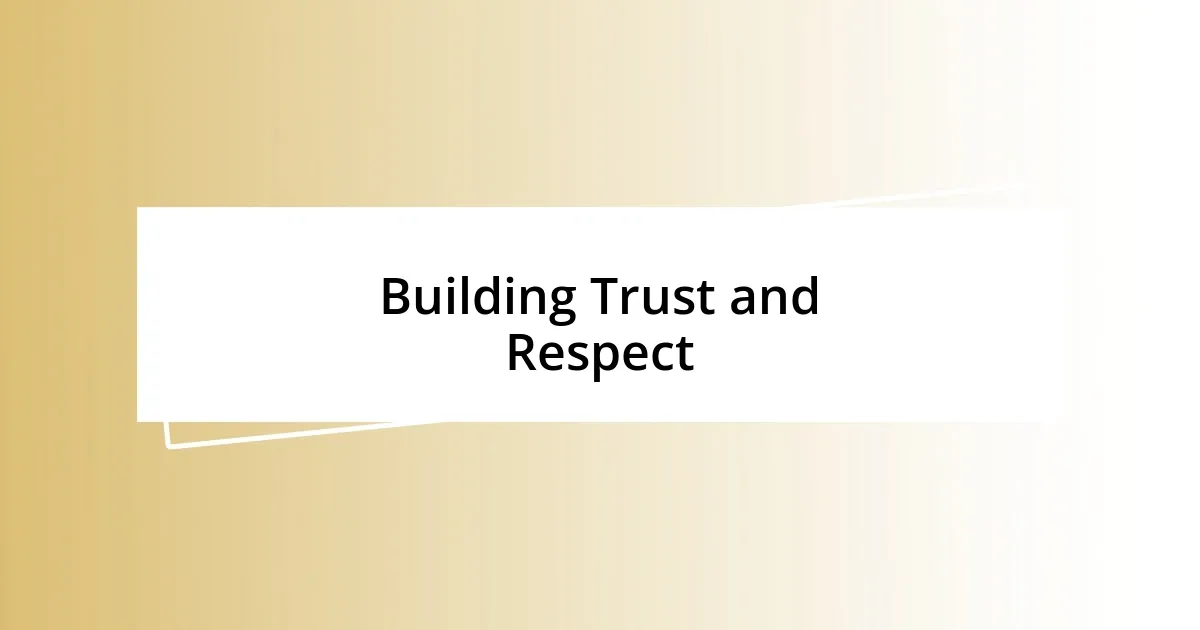
Building Trust and Respect
Building trust and respect is a gradual process that requires consistent effort. I recall a time when I misjudged a friend’s intentions, assuming they were indifferent when, in fact, they were overwhelmed. When I learned to express my feelings honestly, rather than letting resentment build, it paved the way for a deeper connection. Have you ever found that simply sharing your thoughts can clarify misunderstandings and reaffirm respect?
Honesty plays a crucial role in nurturing trust. I’ve experienced the weight that comes from hiding feelings—like the time I overlooked my partner’s late nights working as “just busy.” When I finally admitted that I missed our quality time, it opened up a dialogue that not only improved our relationship but showed us that vulnerability fosters intimacy. Isn’t it interesting how sharing our authentic selves can cultivate a bond that feels more genuine?
Moreover, I’ve found that keeping commitments is essential for building respect. There was a phase when I kept promising to be there for a colleague but ended up canceling last minute due to my own schedule. Eventually, I decided to reevaluate my ability to commit, leading me to be more upfront about my availability. This practice not only helped me manage my time better but also earned back the trust I had jeopardized. How do you feel when someone follows through on their promises to you? It truly makes a world of difference.
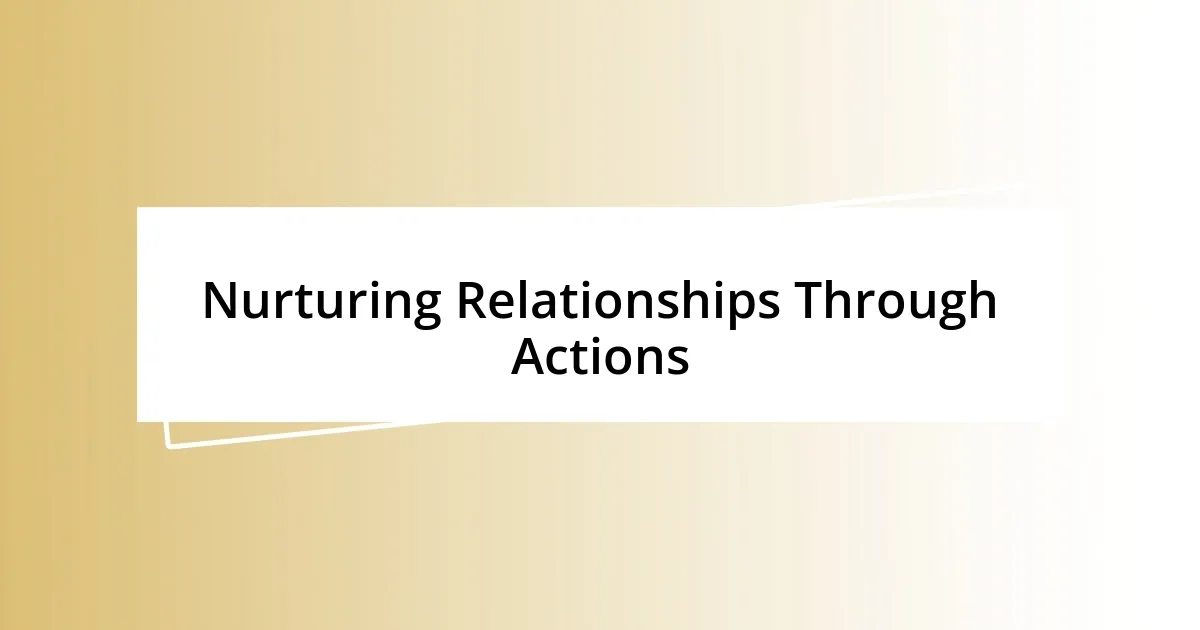
Nurturing Relationships Through Actions
Nurturing relationships through actions is all about demonstrating care and commitment. I remember a particular birthday of a close friend, which I nearly forgot due to my hectic schedule. Realizing my oversight, I quickly organized a small surprise gathering. Seeing the joy on her face wasn’t just about the party; it was a vivid reminder of how small, thoughtful actions can elevate a relationship. Have you ever performed a simple act and felt the warmth of connection it fostered?
Another vital action is showing appreciation. I experienced this firsthand when I started leaving little notes of gratitude for my partner, highlighting the daily things they do that often go unnoticed. The look of surprise and happiness on their face each time was priceless and reinforced how simple gestures can deepen our bond. It leads me to wonder—how often do we take a moment to express gratitude in our daily interactions?
Finally, being present is an action that I believe speaks volumes. I recall a vacation where I put away my phone to truly engage with my family. It was liberating and allowed for meaningful conversations and laughter. The experience taught me that giving undivided attention is a profound way to nurture relationships. Do you remember the last time you felt entirely present with someone you care about? It almost feels like magic, doesn’t it?
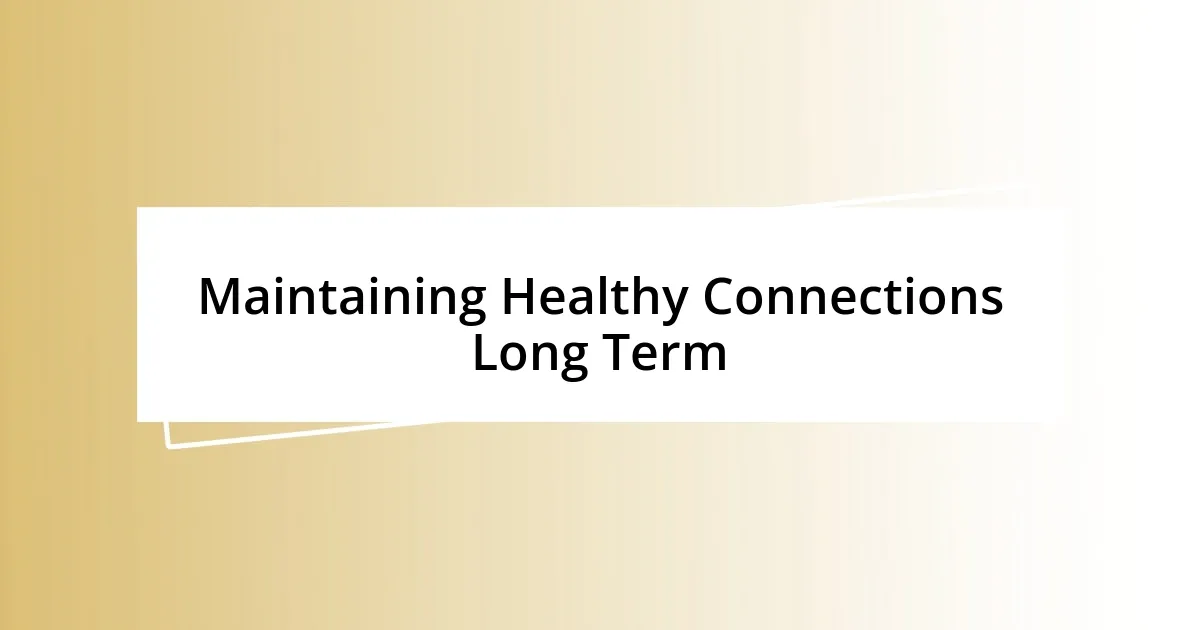
Maintaining Healthy Connections Long Term
Maintaining healthy connections long term involves consistent communication. I remember when I started a weekly ritual of calling my siblings just to check in. At first, I thought it was unnecessary, but those conversations turned into an anchor for our relationships, allowing us to share life updates and just laugh together. Have you ever found that regular chats help you feel more connected to loved ones?
Another essential aspect is the willingness to adapt. I once navigated a rough patch with a close friend who was going through a significant life change. Instead of sticking rigidly to our usual routines, I made an effort to meet her where she was emotionally. This flexibility not only strengthened our bond but also taught me the value of being present and responsive to the evolving needs of the other person. Don’t you think that being there for someone during tough times can really solidify a friendship?
Finally, I find that celebrating achievements—big and small—goes a long way. I vividly recall my excitement when a colleague finally got the promotion they deserved after months of hard work. Organizing a small office celebration for them not only made them feel valued but also reinforced our mutual support. Isn’t it uplifting to recognize others’ successes and milestones? It creates a culture of appreciation that is essential for lasting connections.









